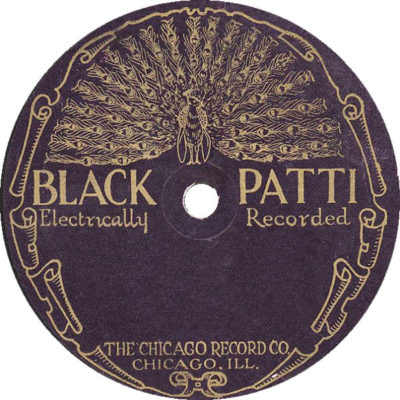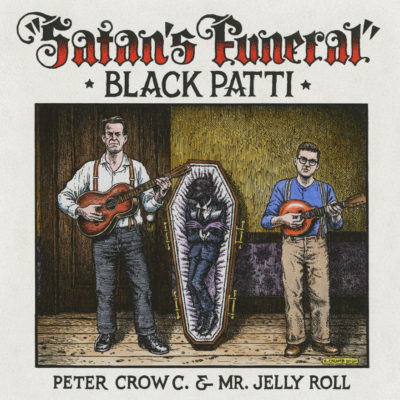By Frank Götz, 2021, with translation by Frank Matheis

The blues has often been declared dead and gone, but one of its best attributes is the ability to survive and reinvent itself. Certainly, we lament the passing of the old vanguard masters. But let’s be optimistic: When mourning the loss of the originators, new musicians always emerge to carry on the tradition. Sometimes they descend directly from the orbit of the legendary masters, but often they seemingly come out of nowhere, or from places least expected. When that happens, it is often a refreshing and exciting renewal.
Take Black Patti, one of the best country blues duos to come out of Germany, and certainly one of the biggest blues talents ever to come out of that country. The duo started out in Munich in 2011, the capitol of Bavaria, a place better known culturally for lederhosen and beer gardens. But the duo founders Peter Krause, born 1967, und Ferdinand Kraemer, born 1990, had other ideas. Their passion was for the old, purely acoustic blues, and they are still committed to this musical genre today. The duo sometimes invites other musicians who are not part of the core duo to join them, such as Ryan Donohue on upright bass, but that depends on the size of the venue and purse of the gig.
The duo took its name from a defunct US record company. Black Patti was a small, obscure Chicago record label of the pre-WWII era. It was founded in 1927 by Mayo Williams, who named his label after a now virtually forgotten African American opera singer, Sissieretta Jones, a “Soprano Who Shattered Racial Barriers,” nicknamed Black Patti because she looked similar to the Italian singer Adelina Patti. The label lasted for only seven months and issued 55 releases before going broke. Their peacock logo was revived decades later by the well-known Yazoo label. That’s also where the Bavarian duo took its brand, and they also cover a few songs from the Black Patti label’s repertoire.
Some blues musicians give themselves exotic-sounding stage names that often become more famous than their own. That’s as common today as it has always been, and Black Patti is no exception: When the Munich lads get on stage or into the studio they appear as Peter Crow C. (Krause) and Mr. Jelly Roll (Kraemer). These pseudonyms are their artist names, both humorous and somewhat self-ironic. Ferdinand Kraemer’s selection is a personal tribute to the great Jelly Roll Morton because his first name was Ferdinand, too. And Peter Krause explained that his puzzling moniker “Crow C.” is derived from the phonetic pronunciation of his last name, as they would say it in Texas.
Unquestionably, these guys are the real deal. They have released three CDs, and all are deeply rooted in the old-time blues. On March 25, 2021, during pandemic times, thecountryblues.com interviewed the pair via Zoom.
 Black Patti plays on the local blues scene, where the duo has a loyal following, as well as in festivals and other events. In 2015 they even performed in the USA, as the lads like to reminisce with a sparkle in the eyes. Kraemer stated that they usually perform 80-100 concerts per year. All in all, they are able to make a living as musicians, which is not always the case for European blues players. They several times pointed out that this schedule comes with a toll and that they don’t have time for side projects, solo appearances or music lessons that could distract from the joint duo activities. Krause explained, “Schedule conflicts are always conflicts of interest: definitely to be avoided”.
Black Patti plays on the local blues scene, where the duo has a loyal following, as well as in festivals and other events. In 2015 they even performed in the USA, as the lads like to reminisce with a sparkle in the eyes. Kraemer stated that they usually perform 80-100 concerts per year. All in all, they are able to make a living as musicians, which is not always the case for European blues players. They several times pointed out that this schedule comes with a toll and that they don’t have time for side projects, solo appearances or music lessons that could distract from the joint duo activities. Krause explained, “Schedule conflicts are always conflicts of interest: definitely to be avoided”.
Their interplay on stage is defined by mutual trust and synergy and is nothing short of impressive. They switch off leads and accompaniment, their voices harmonizing melodically and rhythmically. Instrumentally they are inseparably welded together. It is evident that these are full-blooded musicians at work, with each of them mastering two instruments: Kraemer plays mandolin and guitar while Krause covers guitar and harmonica, supported by their strong and finely harmonized singing. There is an inherent joy in their music and stage presence, as they forge a blues sound that is not from the cotton fields of the Southern US, but “from the fields of hops grown in the Southern German state of Bavaria,” as a German music critic observed after seeing a superb Black-Patti show.
Indeed, this is country blues at its finest, stylistically authentic and often performed on vintage instruments. One of the main features of this stunning duo is that they are both songwriters of original material and great interpreters of old classics, each musically as good as the other. Hard to say what we enjoy most. These guys are accomplished storytellers and in their self-penned tunes, they sing of joy and hardship, bank debts and broken hearts, nagging girlfriends and Friday night loneliness, complete with danceable rags, jigs and shuffles that celebrate their musical skills. It’s all good and entertaining and well worthy of the accolades and awards Black Patti has already received.
Their newest album is titled Satan’s Funeral, released in April 2021, but even before the official unveiling it made quite a stir on social media because the cover was designed by Robert Crumb, the legendary American underground comic artist. Blues and jazz lovers know him as the designer of cover art and Zap Comix from the hippie era, but he is also a famed 78 record collector and a roots musician. He rarely draws cover art for living musicians, so that alone makes this one a sensation. Up to now he is famous for his covers for Janis Joplin and for his own ensembles, the Cheap Suit Serenaders, John Heneghan & His Henpecked Husbands and Eden & John’s East River String Band.

Crumb, however, was not hired on commission. According to our Bavarian duo, he drew the cover simply because he was impressed with the quality of their music. We couldn’t agree more – this stuff is first class. Up to now, the roots & blues loving players from Munich were in a niche in the German speaking world and, to a lesser degree, in the States. Satan’s Funeral should give them wider exposure. They have what it takes musically, and they certainly deserve greater recognition, even without the artistic contribution of their famed musical soulmate, Robert Crumb’s marvelous cover.
Bravo, Black Patti! We are happy they took the time to answer a few questions directly:
thecountryblues.com: This coming June, Black Patti celebrates its tenth anniversary, quite a milestone for a European blues ensemble. How did you meet?
PK: We met through Rainer Wöffler, a mutual friend. FK: It was 2008 or 2009, I think, after we had a gig here in Munich. I performed with Rainer and he introduced me to Peter, who gave me one of his CDs. I was blown away because I was still in high school but totally infatuated with country blues.
thecountryblues.com: It’s not unusual for Americans and English to play country blues. But two Germans from Bavaria? How did that happen?
PK: I didn’t like the pop-music of my youth. I found my first blues record in a flea market in my mid-teens. It was Lightnin’ Hopkins. I liked it so much that I wanted to hear more. Well, I found those records and tapes on the fourth floor of a giant Munich warehouse. Behind a big door they only had jazz and blues albums. That’s where I found the great Blind Blake. Upon hearing his music, I didn’t want to hear anything else. Because of him I wanted to pick up the guitar. I simply had to know how to play this music. FK: I am a bit younger than Peter. Blues culture was more widely available then. Lots more. My initiation came through a documentary by Wim Wenders that was running in the movie theater. It was a film about Blind Willie Johnson und Skip James. I was about 14 or 15 years old. [The movie FK is referring to here is “The Soul of a Man”, Wim Wenders’ contribution to a seven-part blues documentary by Martin Scorsese which he had produced at the millennium for PBS. Today you can buy it as a DVD, in single discs or as a part of the box set titled “The Blues. A Journey to the Roots of the Blues”, McCone 2003.] My uncle worked in a small Munich movie theater and he always pointed out when something cool was playing. In that film soundtrack I first discovered these old voices. It was a sound that was compelling and moving, it just pulled me in. That was my initiation into the blues. From that point on I slipped deeper into the history and culture of the blues. I listened and read and over the years I discovered many important voices.

PK: I have always been interested in obscure, almost forgotten musicians, or those that many people don’t know about. People like Bo Weavil Jackson, for example, or Smoky Babe, a less known musician from the ‘60s. He is a very excellent bluesman, in my view. An artist who should be heard by all.
FK: By now we have virtually the same taste in music. We are often excited and inspired by the same stuff. I also favor lesser known, obscure artists. I like Little Hat Jones, for example, or Blind Teddy Darby, two favorites from the early days; or Crying Sam Collins, another early artist we both admire. Collins originally recorded on the old Black-Patti record label. He’s an amazing singer who will grab you by the heart.
Enough said. Time to let the music speak. Here’s a small selection of video samples that show just how good these Bavarian blues boys really are. Enjoy!
Website: https://black-patti.de


